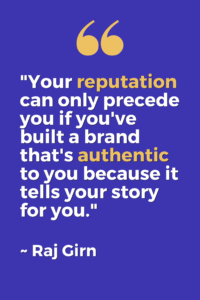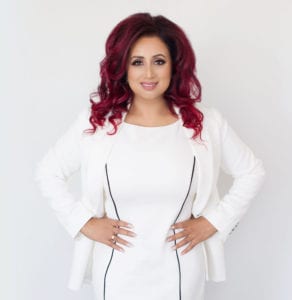Raj Girn: This week’s theme is Branding and Marketing, where I deep dive into a subject matter that I’m absolutely passionate about. This week we are going to be tackling how do you market your brand in today’s information overload culture. To help me do this my guest is the fabulous Shama Hyder, who is the visionary strategist for the digital age, a web and TV personality, a two-time best selling author, and the award-winning CEO of Zen Media, a global marketing and digital PR firm that helps B2B and B2C brands make meaningful connections with the modern-day customer via influencer marketing and experiential and digital storytelling and then turn them into bottom-line results.
This is Part One of our conversation:

Raj Girn: Please welcome to the show, my girl, Shama Hyder. Thanks so much, sweetheart, for agreeing to be on this show.
Shama Hyder: Only for your Raj, only for you.
Oh my gosh. You know, I want to just jump right in, sweetheart, because there’s just so much wealth of wisdom from your experience that I want to allow all of my listeners, the audience, people who read this on the podcast and they watch it on YouTube to really garner experience-based marketing tips, especially with everything that’s going on in the world today. So I want to start by giving some context. First, on your experience, can you share some of the highlights from your journey so far in building Zen Media?

Let me share my story real quick with you and the listeners, viewers, however, you’re consuming this podcast, I guess. And hopefully, it’ll be valuable because I know so many people are making the transition right now, whether they’re starting businesses, as we see for the first time, a huge spike in entrepreneurship or they’re switching careers, whatever that might be, whatever that might look like for them or for you as you’re watching. So I started Zen Media right out of grad school. I was 22 years old. I did my thesis on Twitter when it had 2,000 users and I couldn’t get a job in the real world because there were no jobs in the field. The field itself was so new. And so from that point, obviously we’ve grown quite a bit as a company. We passed our first million in the first three years of doing business.
We’ve continued to grow into earned and owned media. So everything from content, social influencers. Our specialty is really how do you break through the noise? And when I started the company, I knew very little about business, knew a lot about marketing and trends and social. And so it’s been an interesting process of having to learn all these things. And so I find this world fascinating. I think there’s so much opportunity right now for anyone looking to build a brand. Yes, it’s challenging in that it is not easy. There’s so much happening. We have to realize so much is happening because people are paying attention. And wherever there’s attention, there’s room for you to be able to brand yourself. We’re going to be able to connect with people in a meaningful way. And I think that’s really what we do in and out, helping our clients connect with their customers in a more meaningful way, whatever that may look like.
So as a subject matter expert, I want to get your take on what you believe branding should be in today’s business world with the obvious virtual explosion that is going on and is going to continue to amplify as we move into business being a lot more virtual. What what are your thoughts there?
So let’s look at what we know it’s not going to be. So branding is not your logo. It’s not a billboard. I think that there are so many connotations around what branding is. And it’s really none of those things. Your brand is what people say when you’re not in the room. Your brand is what precedes you. It’s what follows you. It’s your reputation. It’s what you’re synonymous with. And so I think in that way, your brand is a lot greater than what I think most people think about when we talk about the brand. It’s not your logo. Yes, that can be part of your visual identity, but it’s so much greater than that. And especially today we are in a digital age as things get more and more hybrid. You’re not locked into a physical location, not for the opportunities, not for the customers. You could potentially want to work with all these things so your brand becomes even more important. They’ve done some great studies around this. I think it’s been fascinating to see pre-COVID, post-COVID. I know we’re still sort of in the midst of that pandemic, but it’s just interesting to see how much buyer behaviour patterns have changed even in that time.
“Your brand is what people say when you’re not in the room. Your brand is what precedes you. It’s what follows you. It’s your reputation. It’s what you’re synonymous with.” ~Shama Hyder
So even before COVID, what they were finding was that almost over 60 percent of the buyers are through their buying cycle before they even get to a business. So before it used to be like sales is your first stop because salespeople had all the information. Well, sales are now the last stop because the buyers have all the information. So brand really means you’re helping them, you’re closing before you’re even convincing. You’re getting them through that process before they’re actually even talking to someone before they even get to that point. So branding becomes something much broader, much more inclusive of owned media, earned media. Owned media being your content. This podcast is a great example. Earned media would be media relations, press, like what are other people saying about you? And a combination of those things is really what your brand is built around.
So based on what you just said, Shama, what about marketing? What do you believe to be the best way to describe its role in this same expanding virtual world of business?

In some ways marketing is everything, right? And we’re always marketing. And that’s the thing. I mean, whether you’re in an organization and you’re marketing to your superiors and your peers and your colleagues, whether you are in a company when you’re building a business and you’re trying to market to customers. The very, very basic definition of marketing is you are trying to get an idea across. So whether that’s raising money for a nonprofit, it’s just so ubiquitous, this idea of marketing and idea of being able to get people to pay attention to what you are doing and why should they give everything that’s happening in their lives? What’s the trigger? What gets them to engage? That’s really sort of the broad definition of marketing.
“Very basic definition of marketing is you are trying to get an idea across. So whether that’s raising money for a nonprofit, it’s just so ubiquitous, this idea of marketing and idea of being able to get people to pay attention to what you were doing and why should they given everything that’s happening in their lives.” ~Shama Hyder
So why is it crucial to have a brand and marketing strategy as a business owner today based on everything that you’ve said so far?
Well, it’s not crucial. It’s only crucial if you want sales. It’s kind of like saying, well, why is it important to have a good product or service if you’re in business? I mean, if you want to stay in business, it’s absolutely crucial. And so I think marketing Ican no longer be an afterthought. For so many times it’s like, “Oh, we can do all this and then let’s throw on some marketing” as if it’s like a little bit of butter on toast when really it’s how you communicate your ideas and it starts from day one.
And sometimes when we work with clients, they’re not even ready for customers yet. They’re focused more on investors, even marketing to investors is a whole different thing. A lot of the clients we work with, it’s not even the customers they’re trying to attract and retain talent. So that becomes how do you attract and retain talent from that perspective? So in that way, marketing can’t really be an afterthought if you’re going to compete in today’s landscape.
So with people who are looking at starting their business and they have to kind of figure out how to start their brand from scratch, what are some of the must-dos that you can share with those people?
So the first thing you want to think about is as the outcome. What do people get for working with you, whether that’s a product or service? I think so many times, especially when you deal with B2B, or if you’re in engineering or data background, it can get really weighed down in the process. But you’ve got to think about the outcome. Why does someone engage with you? What is it that they want at the end of the day? What are they looking for?

So I think getting crystal clear on that and then figuring out your differentiator. Because why do we talk about anything? We talk about something because it’s different. It stands out. We don’t even comment on the weather unless it’s an anomaly like it’s something different. So we do think it’s worth spending the time to really figure out what is your differentiator? How do you stand out in the current marketplace? And how do you fit? How are you fulfilling a need for your market that’s not currently being met?
So with that said, I mean, this is a very important relationship between branding and marketing, where people kind of use the terms interchangeably. But they have a very distinctly different, yet very aligned purpose. I want to ask you this Shama, what are the basic marketing elements that all brands should have in place to go to market irrespective of the size of the company and the stage of their growth?
So if you think about it this way, we call this the PESO model in-house (paid, earned, shared, owned). Part of this is figuring out what area do we want to grow, invest in. And they all have to play together. And so if you think about owned channels or things that you own, like your copy, your website, you have full control. So if you have full control over something it’s generally owned. This podcast for example is owned media. Then you look at earned. Earned is third party. So while this is an owned channel for you, Raj, this is earned for me. Because it’s not something that’s paid. It’s not a PR opportunity. It’s an invite-only opportunity. It’s a media opportunity. So it’s earned, its third-party credibility. So that’s a whole different sector.
And by the way, these things apply to any business. It’s just going to be a matter of the scale of how much you invest and how you grow based on what your goals are. And then you have shared. Shared is social. So wherever this podcast gets placed, shared, if you like it, if you share it, then you are participating in the shared media aspect. And then you have the feed. So feed is advertising. I think that’s something that most people think is synonymous with marketing even then more than branding. And it’s really not. Advertising is a type of marketing, but advertising is different. It’s where you pay to play. So when you’re running Facebook ads or Instagram ads where you are paying a platform to get a share of their audience or get eyeballs or visibility, that’s paid media. So this is a good framework for anybody looking to figure out, how do I make sense of my marketing?
“Advertising is a type of marketing, but advertising is different. It’s where you pay to play.” ~Shama Hyder
So do people need to dial all of those in? Like what are some of the benchmarks that you look at and you advise brands on, depending on whether they’re small, medium or large? I know a lot of it has to do with budget and intention and all of that. Can you help people understand that piece? Because your model is obviously everything that you can dial in. If you had to pick and choose, perhaps you go into market for the first time. What are some of the things that you could say to them in terms of that model that you just shared?
So here’s what I would say. It’s not a matter of do you need this? It’s how much you do within a category. So for example, owned for someone just starting out may just look like a website. That’s owned media. But you need to have that right now as you scale. You might have your website, you might have the podcast, you might have an email newsletter. You’ve got more. I mean, all of it is just a matter of scale. How quickly do you want to grow? And this is what companies do all the time. By the way, if you ever wonder why these companies that are not profitable are growing the way they are, they understand they’re not trying to make a profit.
They’re trying to grow in growth means investing into it. And look, at the end of the day, it all comes down to two things in marketing and I’m going to be very blunt. It’s time and money. So when you’re starting a business, it’s time as you put in your time. You work hard, you do the outreach, you put in the time. And then as your time becomes more valuable, you put in the money. And this is the basic premise is what corporate America follows. This is what, globally, corporations follow. This is what individual businesses follow. When you’re just starting out, when you are a one-man or one-woman band, it is time. And time is what you have and time is what you invest.

Absolutely. And all of the different ways that you can kind of go to market today requires content. It requires telling a story on some level. So content marketing has clearly become the holy grail of creating relationships with audiences, especially audiences that are cold. Audiences don’t know who you are. They don’t know what your value proposition is, and they don’t know if they want a relationship with you. I want to ask you this. What is it that you’ve seen that content marketing can do, that other forms of marketing cannot based on campaigns that you’ve done with clients?
Well, if you think about content marketing, it’s a perfect example of owned media, right? It’s you getting to tell your story. So the most powerful thing there is that you’re controlling the narrative and that it’s your story, it’s your platform. You have the mic. And then if you think about content marketing in the form of its value, how are you driving value to your audience? And it can look different. I mean, people on TikTok right now who are TikTok influencers, they are creating value. They are doing content marketing. Now, given it is a third-party platform. But it is their content, their creation. So it’s a little bit of owned and shared, kind of merged a little bit there.
But yeah, I think at the end of the day, you have to think about your audience and what is valuable to your audience and that is what you have to deliver to them. So that’s going to look very different based on what your businesses see. So people like to think marketing is magic and it’s not. Marketing is not magic. It’s very much knowing your audience, knowing where they are and then consistently being in front of them. I mean, you think about all these brands that we think of when we think of anything, just the most famous brands in the world. How do you think they got there? They get there through marketing, branding and consistently being in front of us. They have mindshare. So at the end of the day, what you’re really hoping for is the more mindshare you can get from your customer base, your prospect base, the better.
“People like to think marketing is magic and it’s not. Marketing is not magic. It’s very much knowing your audience, knowing where they are and then consistently being in front of them.” ~Shama Hyder
For someone going into the content marketing arena for the first time, what are the need to knows to put together a solid content marketing strategy specifically to solicit clients?
So a couple of things. I’ll say it this way. When you say solicit clients, one thing I wanna be really clear about is this is not a direct response. Even advertising is not a direct response. And here’s what I mean by this. Most people think they will do one marketing thing and it will result in people flocking to them. This is not how it works or it hasn’t worked like this in a very long time. It’s just not the way. It’s not how we as humans make decisions anymore. In fact, this is an interesting stat from pre-COVID, post-COVID. And I want to say it’s Forrester, but they found that it used to take 17 touchpoints in 2019 before someone went from a prospective buyer. Now, post-COVID, post-pandemic, again we’re still in the middle of it to some degree, but now in 2021, it takes 23 touchpoints. So when you write a blog post, you do something, I think the reaction tends to be because most people play the short game.

This is the thing you really have to play the long game, because I think there’s such a sense of, oh, wow, look, this person did a TikTok video, went viral, and voila and you just don’t realize how much work goes on behind the scenes for anything. I mean, people look at my LinkedIn and they’ll say, oh, you’ve got 640,000 followers. Like, how did that happen? I’ve been on LinkedIn for years, for over a decade, providing content and sharing and publishing articles and sharing thoughtful pieces. It does not happen overnight. None of this happens overnight. And so I think I just want to say, I want to preface that because I think it’s important when people think I will do a little bit of marketing and then it’ll . . . and it’s not how it works. And then they’re disappointed because they’re not playing the long game. But the thing is, if you play the long game, the results are great. You own mindshare, you get category leader, your share of voice goes up. So your market share goes up and it’s all connected the more consistent you are. In fact, LinkedIn sponsored a study and they found that B2B brands that are famous, that are well known, 12 x more in revenue than brands that are not. It doesn’t always show up right away, but it shows up in time. Like certain brands.
I can say Microsoft, Apple, Starbucks, Tim Hortons and you’re like, yes, yes. You know, we may not want that right now, right away, but these brands are embedded. They have mindshare. And that’s where you’re aiming for not global perhaps, not your audience, based on your skill, but maybe within that community. And this is why I think it’s really important to get your business basics right, like having an audience that you serve, having a community that you know you can provide value for sometimes. And people say, oh, who’s your audience? Everyone. Well, everyone is no one. Being really clear on your audience makes a difference. So content-wise, to answer your question, Raj, having a strategy starts with your niche, your audience. What value are you going to provide? Meaning what questions are they asking that you can answer, that only you can answer in your particular way and consistency. This is so key because there’s no content marketing strategy that you can just push something out and then sit back and relax. It takes consistency and it takes work. I think people get very excited. There’s a certain clamour around business and marketing even, and it’s a sexy subject. But when you look at the nitty-gritty, it’s a lot of nitty-gritty. That’s what moves the needle.
“There’s no content marketing strategy that you can just push something out and then sit back and relax. It takes consistency and it takes work.” ~Shama Hyder
To contact Shama Hyder: Web, Instagram, Twitter, LinkedIn, Facebook












